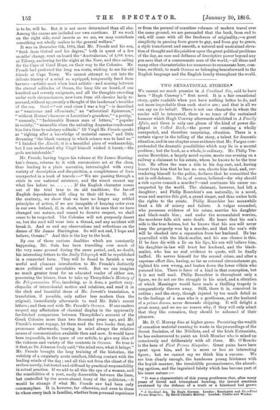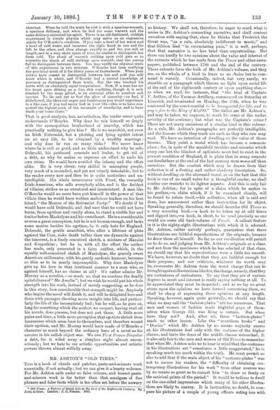TWO SENSATIONAL STORIES.*
WE cannot see much promise in A Cardinal Sin, said to have been "Hugh Conway's" first novel. It is a fair sensational story, quite readable when you have nothing better to do, and not more improbable than such storiis are ; and that is all we can say on its behalf. There is not one character in whom the reader will be interested, there is no trace of the restrained humour which Hugh Conway afterwards exhibited in A Family Affair, and there is only one gleam of the kind of power dis- played in Called Back, —the power of creating a wholly unexpected, and therefore surprising, situation. There is a certain vigour in the telling of the story, a talent for dramatic situation, and in one chapter some evidence that Mr. Fargas com- prehended the dramatic possibilities which may lie in a mental problem ; but the book, as a whole, is ordinary. Mr. Philip Tre- maine Bourchier, a largely acred squire, meets one evening on a railway a claimant to his estate, whom he knows to be the true heir. He offers the man a ride in his dog-cart, and, having learnt from him that he has no son, shoots him dead, and, sur- rendering himself to the police, declares that he committed the act in self-defence. He is, of course, believed—for why should a rich squire commit a murder P—and continues his career un- suspected by the world. The claimant, however, had left a daughter ; and Philip Bourchier's son naturally, in a novel, woos and marries this girl, a grand singer, and thus unites both the rights to the estate. Philip Bourchier has meanwhile lived a life of misery and failure. A vulgar scoundrel, who possesses evidence of his crime, marries his daughter and black-mails him ; and under the accumulated worries, the murderer fulls sick unto death. He hears that his son's wife is the true heiress, but he knows that his son will never keep the property won by a murder, and that the son's wife will be shocked into a separation from her husband. He has quarrelled with the black-mailer, and his one chance is this. If he dare die with a lie on his lips, his son will believe him, his daughter-in-law will trust her husband, and the black- mailer, who has no real evidence to quote, will be finally baffled. He nerves himself for the second crime, and after a supreme effort dies, having, as far as external circumstances go, righted his own wrong, and beaten down the lower villain who pursued him. There is force of a kind in that conception, but it is not well used. Philip Bourchier is throughout only a figure, we do not see the struggle in his mind, and a situation of which Massinger would have made a thrilling tragedy is comparatively thrown away. Still, there it is, conceived in outline ; and the story, though injured by too much detail as to the feelings of a man who is a gentleman, yet the husband of a prima donna, never demands skipping. It will delight a great many, and we see no reason why, if they will only admit that they like sensation, they should be ashamed of their pleasure.
Mr. D. C. Murray flies at higher game. Perceiving the wealth of sensation material running to waste in the proceedings of the Secret Societies, of the Nihilists, and of the Irish Extremists, he has endeavoured to paint an Irish Member who is mixed up consciously and deliberately with all three. Mr. O'Rourke is the hero of First Person Singular. Great pains have been spent upon him, and he is more or less an interesting figure ; but we cannot say we think him a success. We see him clearly enough, the handsome young Irishman with the boyish manner, the irresistible persuasiveness, the absorb- ing egotism, and the ingrained falsity which has become part of his inner nature :—
"It was a characteristic of this young gentleman that, after many years of fervid and triumphant humbug, the inward emotions awakened by the defence of a truth or a falsehood had grown • A Cardinal Sin. By Hugh Conway. London • Remington and CO.—Firs t Person Singular. By David Christie Murray. London : Chatto and Wians. identical. When he told the truth he told it with a spurious warmth, a spurious delicacy, and when he lied the same warmth and the same delicacy animated his spirit. There is an old-fashioned, childish experiment in simple physics which may serve as an expressive simile for O'Rourke's condition. If you take a bowl of hot water and a bowl of cold water, and immerse the right band in one and the left in the other, and then change rapidly to and fro, you will at length, and in a very short space of time, be unable to distinguish hot from cold. The shock of warmth striking upon cold gets so to resemble the shock of cold striking upon warmth, that the nerves fail to distinguish between them. You may verify the physical truth of this experiment in two minutes. O'Rourke had been verifying the psychical truth of it for thirty years or thereabouts. When your eerves have ceased to distinguish between hot and cold you still know which is which, and O'Rourke had a mental knowledge of pretence as distinguished from truth. But the two touched his nerve with an absolutely equal temperature. Now, if a man has set Cs heart upon shining as a liar, this condition, though it is only reached by the moat gifted, is an essential alike to comfort and success. To lie and yet to feel the glow of sincerity—to feel, if disbelieved, the identical anger and forgiveness you would experience in a like case if you had never lied in your life—this is to have con- quered the highest peak of the mountain of mendacity, and to have made your home there."
That is good analysis, but, nevertheless, the reader never quite understands O'Rourke. Why does he mix himself so deeply with the cosmopolitan brotherhood of anarchy, which has practically nothing to give him ? He is no anarchist, not even an Irish Extremist, but a plotting and lying egotist intent on an easy life, to be obtained by a wealthy marriage ; and why does he run so many risks ? We never know where he is evil or good, and as little understand why he sells Dobroski, his professed comrade and leader, to get rid of a debt, as why he makes so supreme an effort to undo his own crime. He would have avoided the infamy and the effort alike. He is very clever, very skilful in managing people, very much of a scoundrel, and yet not utterly detestable ; but to the reader every now and then he is quite motiveless and un- intelligible. His whole intercourse with Frost, the cowardly
Irish-American, who sells everybody alike, and is the feeblest of villains, strikes us as unnatural and inconsistent. A man like O'Rourke would no more have put himself in the power of that villain than he would have written malicious leaders on his best friend, "the Momns of the Extremist Party." We doubt if he would have sold Dobroski, and feel sure that he could not have
borne, from egotism and vanity alone, to stand a visible liar and traitor before Maskelyne and his sweetheart. He is a considerable .or even a great conception, but he is not human enough, and lacks some motive besides his egotism, be it only hate for England. Dobroski, the gentle anarchist, who, after a lifetime of plots against the Czar, risks death rather than use dynamite against the innocent, is a finely conceived sketch, a mixture of Mazzini and Krapotkine ; bat he is, with all the effort the author has made, only presented in a feint outline, which, in the -equally well-conceived sketch of Maskelyne, the gravely sweet American millionaire, with his gently sardonic humour, becomes so thin as to be nearly imperceptible. Why does Maskelyne give up his love in that irrational manner to a man who, as against himself, has no claims at all ? We rather admire Mr. Murray as a novelist,—so much so, that we condone the deadly spitefulness of " Mr. Amelia"; but we wish he would put his whole -strength into his work, instead of merely suggesting, as he does in this story, how considerable that strength might be. Anybody who begins the novel will finish it, and will be delighted here and there with passages showing acute insight into life, and particu- larly the life of the incompletely bad ; but he will, as he goes on, long for something which the author, we suspect, having read all his novels, does possess, but does not put there. A little more pains and time, a little more perception that egotists shrink from basenesses which seem base to themselves, and therefore wound their egotism, and Mr. Murray would have made of O'Rourke a character as much beyond the ordinary hero of a novel as his success in his selfish object was. We owe First Person Singular a debt, for it wiled away a sleepless night almost uncon- sciously ; but we hate to see artistic opportunities and artistic powers thrown almost wilfully away.



































 Previous page
Previous page